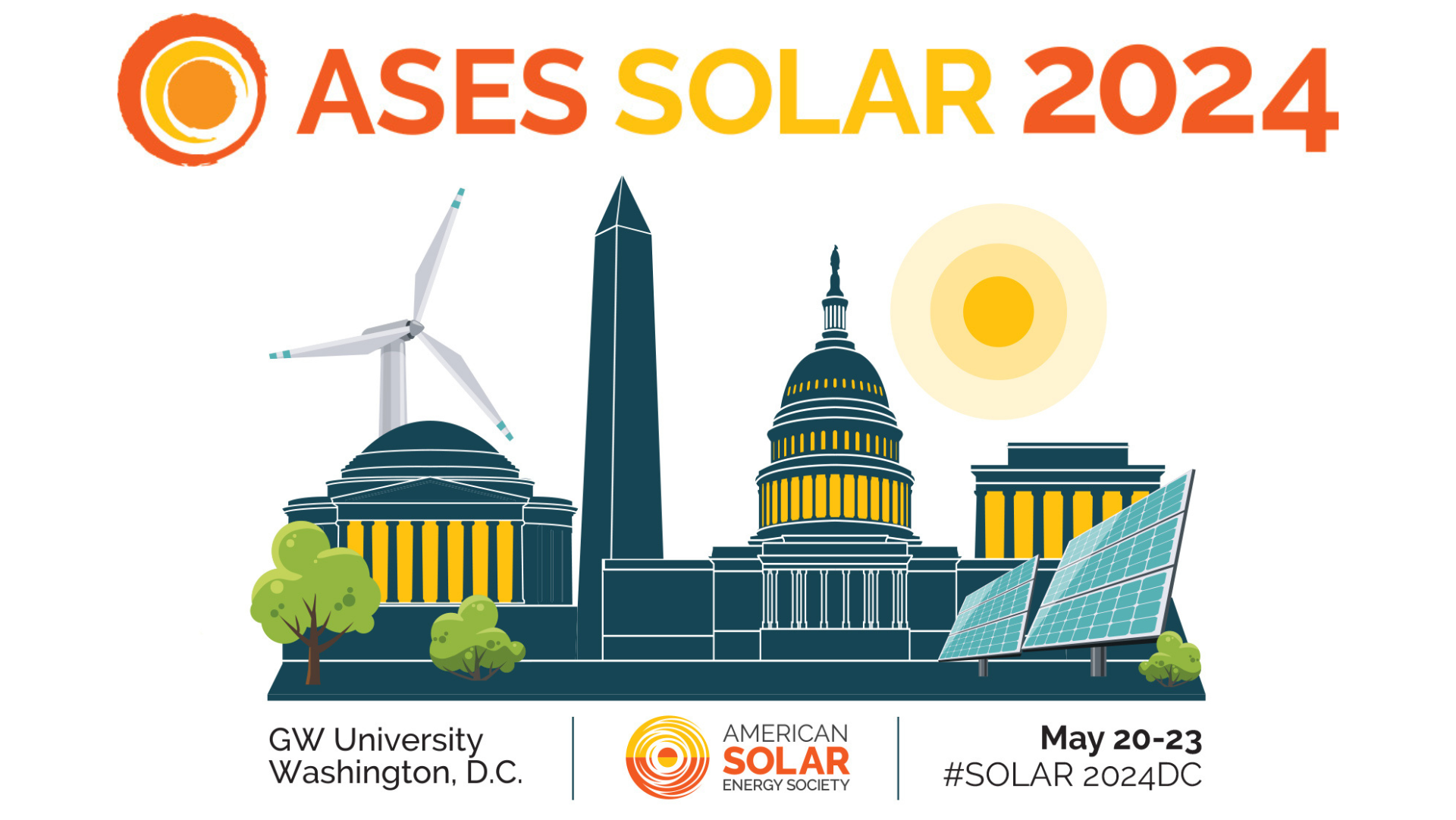September 15, 2023

The American Solar Energy Society (ASES) supports the global initiative that a world equitably transformed to 100% renewable energy is an urgent necessity. The ASES National Solar Conference, SOLAR 2024: Connecting Technology & Policy, will elevate public, institutional, and governmental awareness of the critical role solar energy is playing in the global energy landscape. We must ensure that access to and the benefits from clean energy will be enjoyed by all communities, especially those that have been denied those benefits in the past. ASES invites you to submit a proposal to present at next year’s conference around the theme “Connecting Technology & Policy.” Submissions will be accepted until November 15, 2023.
The track category is the heading(s) under which your abstract will be reviewed and accepted or rejected by the SOLAR 2024 Technical Review Committee (TRC). Potential lists of topics include:
Track 1: Technology Innovations and Life Cycles (Applications of PV and Solar Thermal, Life Cycles and Impacts)
-
Material Design for Energy Applications
-
Emerging Cleantech Trends
-
Decarbonizing Transportation and Industry
-
Large-Scale Projects – From Site Selection to Operation to Evaluation
-
PV Innovations
-
Solar Thermal
-
DIY PV, Heating, Water Distilling, Solar Cooking
-
Solar Fuels and Artificial PV
-
Hydrogen, Fuel Cells
-
Extended Applications of Thermal Heat
-
District Heating & Cooling
-
Concentrating Solar-Thermal Power (CSP)
-
Hybrid Systems
-
Circular Economy
-
Weather and Energy-Related Research (Climate Scenarios, Extreme Weather Events, Trends, Socioeconomic Impacts of Energy Choices, Research Needs)
-
Greenhouse Gas Mitigation
-
Energy/Water/Food Nexus (Agrivoltaics, Land and Water Use Issues, etc.)
-
Mining Minerals
-
Economics of Climate Change and the Clean Energy Transformation (LCOE Comparisons from IRENA, Others)
Track 2: Grids and Solar Communities (Smart Grids from Nano to Micro)
-
Community Solar and Co-ops
-
Solar Communities
-
National Grid Expansion
-
Municipal Grids
-
Microgrids
-
Energy Storage
-
Distributed Generation
-
Demand Side Management
-
Grid Infrastructure & Modernization
-
Grid Operations
-
Grid Resilience (Weather, War, etc.)
-
Off-Grid Freedom, Energy Independence
-
Resource Assessment
-
Agrivoltaics
Track 3: Net Zero Energy Buildings, Passive Heating and Cooling (Decarbonizing the Building Sector)
-
Building New vs. Renovating
-
Net Zero Energy Buildings in DC Metro Area and at George Washington University
-
Passive Solar Heating and Cooling
-
Electrification
-
Building Envelope Efficiency
-
Material Research and Effieciency
-
Sector Examples (Residential Single-Family and Multifamily, Commercial & Institutional Buildings)
-
Solar Decathlon Projects
-
Energy Analysis and Design Tools
-
Solutions for Urban Heat Islands
Track 4: Education and Training (Educating & Engaging Stakeholders)
-
Energy and the Media
-
Anticipating and Addressing Opposition to a Decarbonized Energy System
-
Sustainability as a Dynamic Organizational Capability
-
Youth Climate Justice and Solar Citizen Movements
-
Interstate Renewable Energy Council (IREC) Career Map Tool
-
Workforce Development, Mentoring, Curriculums
-
Equity and Justice
-
JEDI in Energy Industry, Education, Workforce
-
Solar Valuation in Real Estate Transactions
-
Clean Energy Jobs Update
-
PV Installation Training
-
Tech College, and University Curriculums
Track 5: Policy, Legislation, Economics, and Finance (Equitable Energy Ownership and Access—Policy, Regulation, and Investment)
-
Novel Financing for Solar Energy (On-Bill, Property-Assessed Clean Energy (PACE), Protective Action Criteria (PAC), Ratings, Utility Green Pricing…)
-
Ownership and Energy Access to Traditionally Energy-Burdened Remote/Rural/Island/Tribal Communities: What Can They Teach Us?
-
Solar on Native American Reservations
-
Business Policies for Solar (Subsidies, Green Appraisal Act, etc.)
-
Energy Economics
-
Comparing Fossil Fuels Economics and Renewable Energy
-
Effects of the IRA
-
Other Government Funding and Impacts (Infrastructure Bill, etc.)
-
Best Practices at State, Local, and Tribal Level
-
Politics to Policy